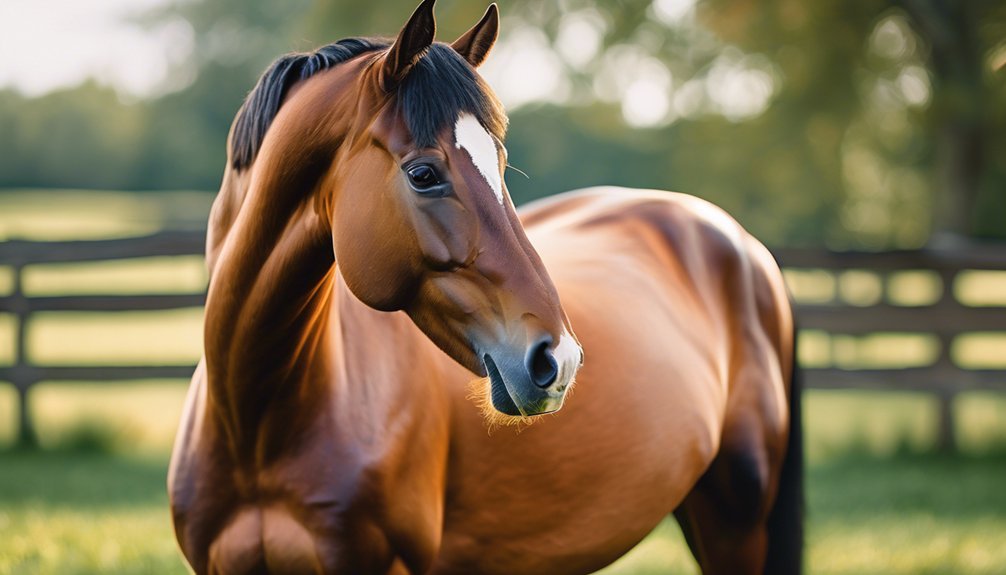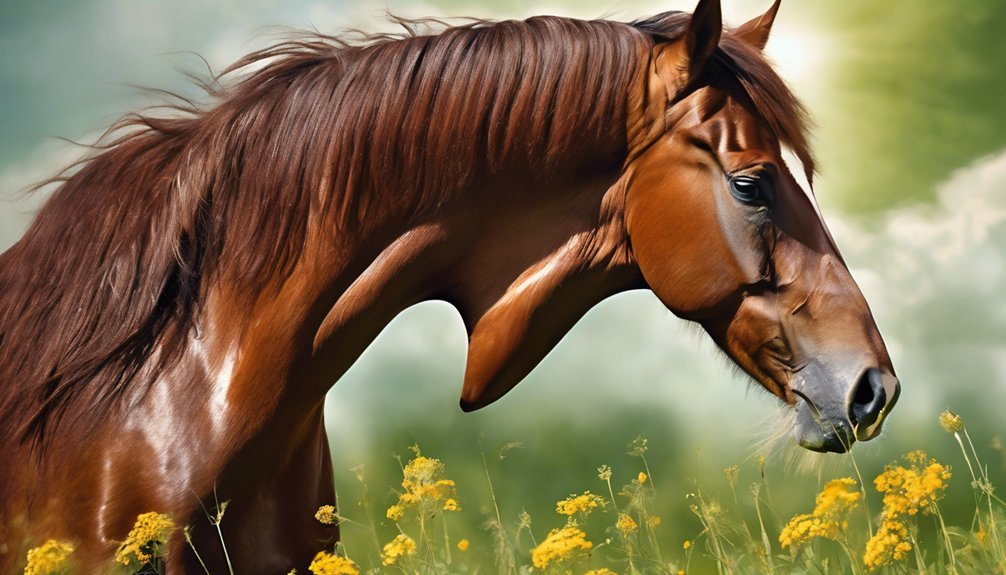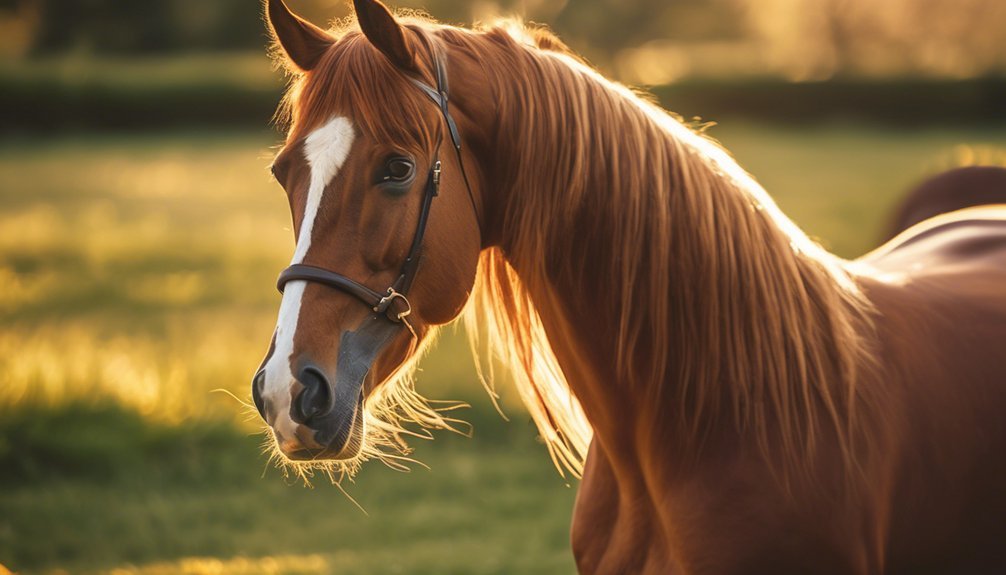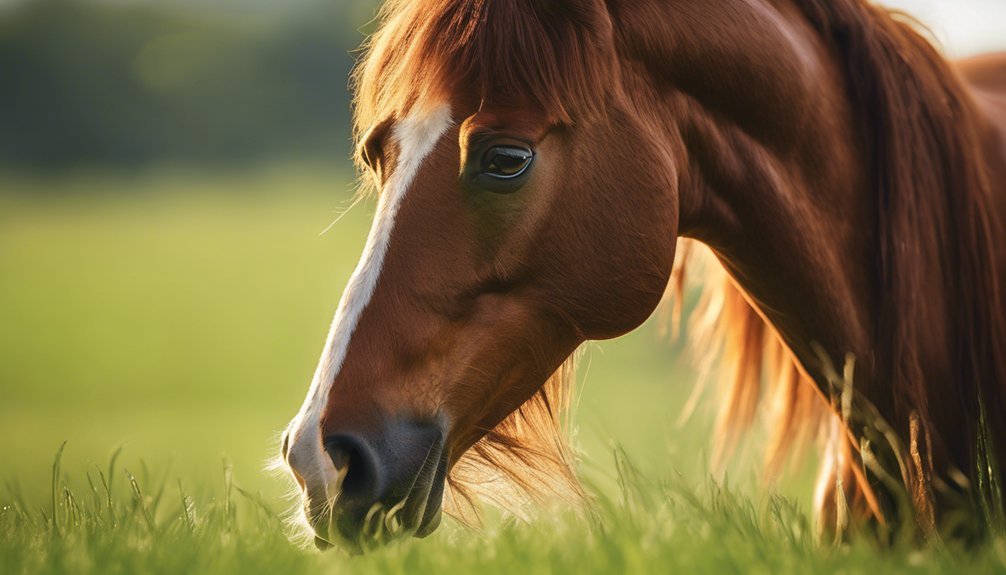
Did you know that the condition of your horse's coat can reflect its overall health? Essential vitamins play a pivotal role in maintaining not just a shiny coat, but also the well-being of your horse. Each vitamin contributes uniquely to skin vitality and coat integrity, making it crucial to understand their functions. By ensuring your horse receives the right balance, you can significantly enhance its appearance and health. What specific vitamins should you focus on for optimal results?
Key Takeaways
- Vitamin A promotes healthy skin and a shiny coat while boosting the immune system.
- Vitamin E protects skin and fur from oxidative damage and reduces inflammation.
- B Vitamins enhance coat shine, reduce stress, and improve nutrient absorption.
- Vitamin D is essential for calcium absorption, which is crucial for skin health.
- Biotin supports hoof and coat integrity by enhancing keratin production.
The Importance of a Healthy Coat

While you mightn't think about it often, a horse's coat is a crucial indicator of its overall health and well-being. The condition of your horse's coat reflects not just its physical state but also its emotional happiness.
Regular grooming techniques, like brushing and currying, help to distribute natural oils, remove dirt, and stimulate blood circulation, contributing to a glossy and vibrant coat. Pay attention to any changes in texture or color; these can signal underlying health issues.
Additionally, a well-maintained coat can protect against environmental stressors, ensuring your horse feels comfortable and secure. By prioritizing coat condition through consistent grooming, you're investing in your horse's overall health and happiness, fostering a deeper bond between you both.
Vitamin A: The Foundation of Skin and Coat Health
Vitamin A plays a pivotal role in maintaining the health of your horse's skin and coat, as it directly influences cellular growth and repair.
Ensuring your horse gets enough Vitamin A is crucial to prevent deficiencies, which can lead to dry, flaky skin and a dull coat.
Here are three key benefits of Vitamin A for your horse:
- Promotes Healthy Skin: Supports the integrity of skin cells, preventing issues like dermatitis.
- Enhances Coat Shine: Contributes to a vibrant, glossy coat that reflects your horse's overall health.
- Boosts Immune Function: Aids in your horse's immune response, keeping skin infections at bay.
You can find Vitamin A sources in fresh grass, carrots, and fortified feeds.
Regular monitoring helps prevent Vitamin A deficiency, ensuring your horse looks and feels its best.
Vitamin E: Antioxidant Power for a Shiny Coat

When it comes to achieving a lustrous coat, few nutrients rival the benefits of Vitamin E, an essential antioxidant that protects your horse's skin and fur from oxidative stress.
This powerful nutrient plays a crucial role in maintaining healthy cell membranes, ensuring your horse's coat remains shiny and vibrant. You can find Vitamin E in various antioxidant sources, such as green leafy vegetables, nuts, and seeds.
Supplementing your horse's diet with these foods can significantly enhance their coat quality, promoting a smooth and radiant appearance. Moreover, Vitamin E aids in reducing inflammation, which can also contribute to a healthier coat.
B Vitamins: Supporting Overall Health and Appearance
Although often overlooked, B vitamins play a vital role in your horse's overall health and appearance, directly influencing coat quality.
Here are three key B vitamin benefits:
- Improved Coat Shine: B vitamins contribute to a healthy, lustrous coat by supporting skin cell regeneration.
- Reduced Stress: They help manage stress levels, which can otherwise lead to dull fur and skin issues.
- Enhanced Nutrient Absorption: B vitamins facilitate better digestion, allowing your horse to utilize nutrients effectively.
To ensure your horse receives adequate B vitamin sources, consider adding alfalfa, oats, and leafy greens to their diet.
Vitamin D: Enhancing Calcium Absorption for Skin Health

While B vitamins bolster your horse's coat health through improved nutrient absorption and stress reduction, another key player in maintaining skin vitality is vitamin D.
This essential vitamin enhances calcium absorption, crucial for your horse's overall skin health. A strong calcium relationship ensures that your horse's skin remains resilient and vibrant.
You can source vitamin D from sunlight exposure, but it's also found in certain feed additives and fortified grains. If your horse doesn't get enough sunlight, especially in winter months, consider supplementing with vitamin D sources.
Omega Fatty Acids: Nourishing From the Inside Out
Omega fatty acids play a crucial role in promoting optimal coat health for horses, as they nourish from the inside out. By incorporating omega supplementation into your horse's diet, you can unlock various benefits that enhance their overall appearance and well-being.
Consider these key advantages:
- Improved Coat Shine: Omega fatty acids contribute to a sleek, shiny coat that stands out.
- Reduced Skin Irritation: These essential fats help soothe dry, itchy skin, promoting comfort.
- Enhanced Overall Health: Omega-rich diets support healthy immune function and reduce inflammation.
When selecting fatty acid sources, look for options like flaxseed, fish oil, or chia seeds.
Biotin: The Essential Vitamin for Hoof and Coat Integrity

Biotin serves as a vital vitamin for maintaining both hoof and coat integrity in horses, ensuring they look and feel their best. This water-soluble B vitamin enhances keratin production, promoting strong hooves and a shiny coat.
You'll find biotin sources in various feeds, such as alfalfa, oats, and certain legumes, making it easier to incorporate into your horse's diet. The biotin benefits extend beyond aesthetics; it also supports overall hoof health, reducing the risk of cracks and brittleness.
Zinc: Promoting Healing and Healthy Skin
Zinc plays a crucial role in promoting healing and maintaining healthy skin in horses, ensuring they remain comfortable and vibrant. A zinc deficiency can lead to skin issues, dull coats, and delayed healing.
To keep your horse's skin in top condition, consider these key points:
- Wound Healing: Zinc helps accelerate recovery from cuts and abrasions.
- Skin Function: It supports the production of collagen and maintains skin integrity.
- Coat Health: Adequate zinc levels contribute to a shiny, healthy coat.
You can find zinc in various sources, such as high-quality grains, legumes, and specialized supplements.
Ensuring your horse gets enough zinc will help promote overall wellness and a beautiful coat.
Selenium: Protecting Against Oxidative Stress

While maintaining a vibrant coat may seem straightforward, ensuring your horse's health goes far beyond grooming; selenium plays a pivotal role in protecting against oxidative stress.
This trace mineral helps neutralize free radicals, which can damage cells and lead to various health issues. Without adequate selenium, your horse may suffer from weakened immunity and skin problems, ultimately affecting coat quality.
Selenium sources include Brazil nuts, seafood, and certain grains, but it's crucial to provide the right amount, as both deficiency and excess can be harmful.
Creating a Balanced Diet for Optimal Coat Health
To achieve optimal coat health, you need to focus on creating a balanced diet that meets your horse's specific nutritional requirements.
Here are three essential components to include:
- High-quality forage: Provides fiber, aiding digestion and promoting a shiny coat.
- Essential fatty acids: Omega-3 and Omega-6 oils enhance skin hydration and coat glossiness.
- Vitamins and minerals: Ensure your horse receives adequate levels of Vitamin E, biotin, and zinc for overall coat vitality.
Regular coat assessments can help you monitor your horse's condition and adjust the diet as needed.
Frequently Asked Questions
How Do I Know if My Horse Needs More Vitamins?
To determine if your horse needs more vitamins, assess its coat condition and energy levels. If you notice dullness or lackluster growth, consider evaluating its vitamin sources and consult a vet for tailored advice.
Can Excessive Vitamins Harm My Horse's Coat Health?
Yes, excessive vitamins can harm your horse's coat health. Vitamin toxicity may lead to coat discoloration, dullness, or even skin issues. It's vital to balance vitamin intake for optimal coat condition and overall well-being.
What Are the Signs of Vitamin Deficiency in Horses?
When you notice your horse's coat lacking shine, it might signal vitamin deficiencies. Poor vitamin absorption can lead to dullness and roughness, indicating a need to reassess their diet and ensure they're getting essential nutrients.
Are Supplements Necessary if My Horse Eats a Balanced Diet?
Even with balanced nutrition, dietary gaps can occur. You might find supplements beneficial to fill those gaps, ensuring your horse gets all necessary nutrients for optimal health and performance. It's worth considering!
How Long Does It Take to See Coat Improvements With Vitamins?
You'll typically notice coat improvement within 4 to 8 weeks, depending on vitamin absorption factors like your horse's diet and metabolism. Consistency is key, so keep monitoring and adjusting as needed for optimal results.
Conclusion
To keep your horse's coat looking its best, think of essential vitamins as the unsung heroes behind the scenes. By ensuring they receive adequate Vitamin A, E, B, D, biotin, zinc, and selenium, you're not just enhancing their appearance; you're nurturing their overall vitality. A well-balanced diet acts as a cornerstone for health, ensuring that your horse not only shines on the outside but thrives on the inside, creating a harmonious balance that reflects their true spirit.





